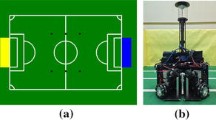Abstract
In this paper it will be presented a proposal of a supervisory approach to be applied to the global localization algorithms in mobile robots. One of the objectives of this work is the increase of the robustness in the estimation of the robot’s pose, favoring the anticipated detection of the loss of spatial reference and avoiding faults like tracking derail. The proposed supervisory system is also intended to increase accuracy in localization and is based on two of the most commonly used global feature based localization algorithms for pose tracking in robotics: Augmented Monte Carlo Localization (AMCL) and Perfect Match (PM). The experimental platform was a robotic wheelchair and the navigation used the sensory data from encoders and laser rangers. The software was developed using the ROS framework. The results showed the validity of the proposal, since the supervisor was able to coordinate the action of the AMCL and PM algorithms, benefiting the robot’s localization system with the advantages of each one of the methods.
Similar content being viewed by others
References
Dellaert, F., Fox, D., Burgard, W., Thrun, S.: Monte carlo localization for mobile robots. In: Proceedings 1999 IEEE International Conference on Robotics and Automation (Cat. No. 99CH36288C), vol. 2, pp. 1322–1328 (1999)
Lauer, M., Lange, S., Riedmiller, M.: Calculating the perfect match: an efficient and accurate approach for robot self-localization. In: Bredenfeld, A., Jacoff, A., Noda, I., Takahashi, Y. (eds.) RoboCup 2005. LNCS, vol. 4020, pp. 142–153. Springer, Heidelberg (2006). doi:10.1007/11780519_13
Sobreira, H., Pinto, M., Moreira, A.P., Costa, P.G., Lima, J.: Robust robot localization based on the perfect match algorithm. In: Moreira, A.P., Matos, A., Veiga, G. (eds.) CONTROLO 2014. LNEE, vol. 321, pp. 607–616. Springer, Cham (2015). doi:10.1007/978-3-319-10380-8_58
Carlone, L., Bona, B.: A comparative study on robust localization: fault tolerance and robustness test on probabilistic filters for range-based positioning. In: 2009 International Conference on Advanced Robotics, pp. 1–8, June 2009
Llarena, A., Savage, J., Kuri, A., Escalante-Ramírez, B.: Odometry-based viterbi localization with artificial neural networks and laser range finders for mobile robots. J. Intell. Robot. Syst. 66(1), 75–109 (2012). http://dx.doi.org/10.1007/s10846-011-9627-8
Pérez, J., Caballero, F., Merino, L.: Enhanced monte carlo localization with visual place recognition for robust robot localization. J. Intell. Robot. Syst. 80(3), 641–656 (2015). http://dx.doi.org/10.1007/s10846-015-0198-y
Vasiljevi, G., Mikli, D., Draganjac, I., Kovai, Z., Lista, P.: High-accuracy vehicle localization for autonomous warehousing. Robot. Comput.-Integr. Manuf. 42, 1–16 (2016). http://www.sciencedirect.com/science/article/pii/S0736584515300314
Censi, A.: An ICP variant using a point-to-line metric. In: 2008 IEEE International Conference on Robotics and Automation, pp. 19–25, May 2008
Pinto, M., Sobreira, H., Moreira, A.P., Mendona, H., Matos, A.: Self-localisation of indoor mobile robots using multi-hypotheses and a matching algorithm. Mechatronics 23(6), 727–737 (2013). http://www.sciencedirect.com/science/article/pii/S0957415813001281
Quigley, M., Conley, K., Gerkey, B., Faust, J., Foote, T., Leibs, J., Wheeler, R., Ng, A.Y.: ROS: an open-source robot operating system. In: ICRA Workshop on Open Source Software, vol. 3, p. 5 (2009)
ROS: Adaptive monte carlo localization approach (2017). http://wiki.ros.org/amcl. Accessed 24 Mar 2017
Acknowledgement
Project “TEC4Growth - Pervasive Intelligence, Enhancers and Proofs of Concept with Industrial Impact/NORTE-01-0145-FEDER-000020” is financed by the North Portugal Regional Operational. Programme (NORTE 2020), under the PORTUGAL 2020 Partnership Agreement, and through the European Regional Development Fund (ERDF).
P.C.M.A. Farias (CNPq-Brazil research fellow) acknowledge support from CNPq/CsF PDE 233517/2014-6 for providing a scholarship.
Author information
Authors and Affiliations
Corresponding author
Editor information
Editors and Affiliations
Rights and permissions
Copyright information
© 2017 Springer International Publishing AG
About this paper
Cite this paper
Farias, P.C.M.A., Sousa, I., Sobreira, H., Moreira, A.P. (2017). Approach for Supervising Self-localization Processes in Mobile Robots. In: Oliveira, E., Gama, J., Vale, Z., Lopes Cardoso, H. (eds) Progress in Artificial Intelligence. EPIA 2017. Lecture Notes in Computer Science(), vol 10423. Springer, Cham. https://doi.org/10.1007/978-3-319-65340-2_38
Download citation
DOI: https://doi.org/10.1007/978-3-319-65340-2_38
Published:
Publisher Name: Springer, Cham
Print ISBN: 978-3-319-65339-6
Online ISBN: 978-3-319-65340-2
eBook Packages: Computer ScienceComputer Science (R0)




